Anything is Possible: Using Ringette to Support Physical Literacy in the North
Originally published by the Sport Information Resource Centre, August 21, 2023.
By: Caela Fenton and Kai Harada
Sport is a vital opportunity for communities in the Northwest Territories (NWT) to stay active and social, particularly during the winter months when daylight is limited and temperatures are frigid. Sport offers a reason for people to come together and keep moving.
It was for these reasons, plus a desire to better serve Indigenous communities in the north, that Ringette Canada partnered with the Sport Information Resource Center (SIRC) and set its sights on returning to the NWT. According to Erin Van Gulik, the organization’s Safe Sport and Sport Development Manager, it had been over 2 decades since the NWT had a ringette organization operating and Ringette Canada wanted to change that.
Ringette Canada enlisted founders of Ringette For All, mother-daughter duo Kim, VP Operations at SIRC, and Alexa Gurtler to lead the programming. Kim, being a long time ringette coach, was on the bench during Alexa’s competitive ringette career. After Alexa suffered a series of concussions, the family switched their focus away from the competitive ringette scene, and instead to creating “a team for children with different abilities.” The pair enlisted Gavin Johnson, longtime adaptive sport facilitator, also of SIRC. Thorsten Gohl, a table tennis coach, serves as the Physical literacy coordinator that oversees all 33 communities in the NWT and was the recipient of the 2023 Delma Kisoun Memorial – Community Contributor Award from Sport North, served as the local guide and host to the group.
Planting seeds for ringette participation
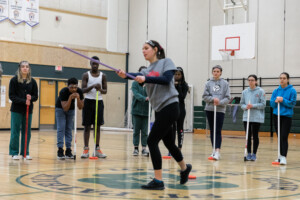 [Kim] Gurtler describes the mission of the trip to be to “plant the seeds” for starting ringette programming in the north. While the team would be offering hands-on workshops for kids, Gurtler’s side mission was to identify potential community members to champion the sport after they left. Alexa developed coaching toolkits for Ringette for All to support coaches who coach players of different abilities, and along with the support of coaching resources from Ringette Canada, she hoped that the recourses could be used by a willing community champion to help get a program off the ground in the north.
[Kim] Gurtler describes the mission of the trip to be to “plant the seeds” for starting ringette programming in the north. While the team would be offering hands-on workshops for kids, Gurtler’s side mission was to identify potential community members to champion the sport after they left. Alexa developed coaching toolkits for Ringette for All to support coaches who coach players of different abilities, and along with the support of coaching resources from Ringette Canada, she hoped that the recourses could be used by a willing community champion to help get a program off the ground in the north.
During the week-long trip, there was a need to be adaptable and pivot numerous times throughout. For example, Johnson and the Gurtlers flew into Yellowknife only to discover that the city was in the immediate aftermath of a general strike, and they would not be able to gain access to the rinks they had planned to use. This incident prompted a pivot to gym ringette at a local high school.
Before they left the gym, the teacher asked to find out more about the sport so she could include ringette in her curricula plans for the next year. The team had its first potential champion. Seeds were being planted, despite the permafrost.
Identifying champions wasn’t as easy in some of the other communities. The team also visited Hay River (population approximately 3550) and Fort Providence (population approximately 700). Considering the population, the 5-6 kid turnout in Hay River was a success, particularly in an area that prides itself on its hockey. In Fort Providence, another 4 kids showed up, 3 of whom had dull skates, which made skating difficult, prompting another pivot from the team.
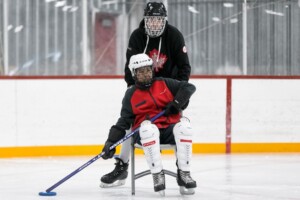 “Alexa had the idea of, ‘let’s use chairs!’ So the 3 of us pushed them around on chairs as they did the drills with the sticks. I think the little boy who could skate kind of wished he was on a chair too because we were all having so much fun,” Gurtler says.
“Alexa had the idea of, ‘let’s use chairs!’ So the 3 of us pushed them around on chairs as they did the drills with the sticks. I think the little boy who could skate kind of wished he was on a chair too because we were all having so much fun,” Gurtler says.
One of the key differences identified was the discrepancy between the kinds of resources that the north and south have. For instance, Gurtler’s Ringette For All team in Ottawa had plenty of human resources in the form of volunteers, however, it lacked financial resources to support athletes. The opposite could be true for the north, as the north had enough financial support but lacked the consistency of coaches and volunteers.
Keep showing up: A message for sport organizations looking to reach the north
The need to foster consistency was a key point for Thorsten, a vocal advocate for sport accessibility across the territories.
“The issues and the struggle we’re facing in the north is that we have lots of things coming and going out. Teachers, nurses and RCMP come and go. For the youth, they don’t have a lot of steady consistency in their lives,” Gohl says.
However, while the pandemic has been hard, Gohl also believes that the increased accessibility of virtual connection is a positive for the north: “The biggest piece is continuation and mentorship. I think organizations need to build a local relationship and come to the north and have the direct contact with the kids. After that, it can be great to connect virtually or via the phone to continue to build that relationship.”
Gohl also emphasizes a need to focus on fun rather than high performance athletics, “You don’t need to bring kids down south and put them in high performance programs in order for them to have a positive sport experience,” he says.
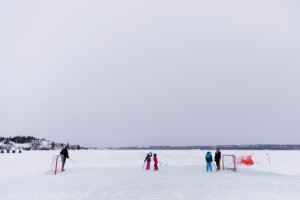 Sport organizations wishing to bring a sport to the north also need to think about scale, according to Gohl: “We need to be thinking, how do I develop the sport here, is it feasible to set up a ringette program in a community of only a couple hundred people? How might we adapt to suit the needs of the community? How can we use other organizations that already exist to help support this one?”
Sport organizations wishing to bring a sport to the north also need to think about scale, according to Gohl: “We need to be thinking, how do I develop the sport here, is it feasible to set up a ringette program in a community of only a couple hundred people? How might we adapt to suit the needs of the community? How can we use other organizations that already exist to help support this one?”
To Johnson, this is where a background in mixed abilities coaching can be an asset. While mixed abilities methods might often be used to facilitate play between participants with different levels of (dis)ability, the tenets can also be used to facilitate play between, say, different age groups. Pivots like the example in Fort Providence, using chairs so that kids with different skating abilities are on a more equal footing, can help ensure an inclusive experience.
Thor’s tips for sport organizations seeking to offer programming in NWT
- Work with a member entrenched within the community and build a connection
- Ask the community what would be most beneficial to them
- Think about the specific needs of the community and keep in mind geographic, social, and financial circumstances
- For example, limited daylight during the winter months, small populations, limited human resources
- Adapt programming to suit the community needs
- When visiting the north send a team that can devote time not only to the kids, but to building community capacity
- Continue the relationship virtually after the visit, so that the participants feel consistently supported
- Make mentorship a key tenet of the program planning
Learning from the north
As mentioned before the mother daughter duo of Kim and Alexa Gurtler had experienced providing mixed ability ringette opportunities within their community in Ottawa.
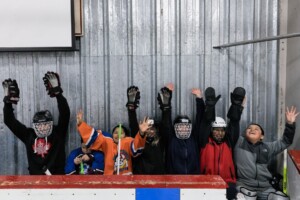 “The mixed ability model provides opportunities for any child and youth to be on a team regardless of their (dis)ability. … That approach feels right for the north at this moment. Everyone could be on the team – regardless of age or ability.”
“The mixed ability model provides opportunities for any child and youth to be on a team regardless of their (dis)ability. … That approach feels right for the north at this moment. Everyone could be on the team – regardless of age or ability.”
She had that same sensation running the workshops in the NWT, a sense of privilege at being able to offer kids an experience they might not have otherwise had, but also a sense of feeling at a loss of how she can best continue supporting northern communities after returning home.
But, Gohl’s motto is, “Everything is possible,” and that rubbed off on the team from Ottawa.
Johnson, who grew up playing hockey and moved through a competitive development pathway, felt similarly, that the trip was a reminder of the importance of fun and play, and not just competition.
“As a kid myself, I always found myself getting into that stream of competitiveness rather than inclusivity,” Johnson explains, “but in my adaptive coaching and particularly during these workshops, I get to see the benefits of making space for everyone and really encouraging that sense of being active for life.”
Kim and Gavin’s tips for working in the north as representatives from the south:
- Always be ready to pivot
- In the end, the goal is to offer an experience for kids to have fun and the local community to learn about a sport. As long as that happens, changes along the way are fine
- Work with the local community
- Identify at minimum 1 local guide who can provide expertise and connect you to the local network
- Help develop human resource capacity, don’t just provide material resources
- Consider how you can support and develop community champions
SIRC’S evaluation
Over the course of the trip SIRC identified key findings compiled on this infographic. Some of these findings were that across the four communities visited, Yellowknife, Fort Providence, Hay River, and Behchǫ̀ko, 244 participants ended up participating in the program, with over 2/3 of participants being girls and women. This was an increase in participants from the last trip in 2021 which had 187 participants. Additionally the youth of the communities were impacted the most by the program with 95% of participants being between the ages of 6 to 17.
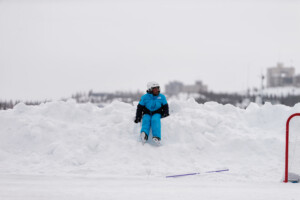 “This is the best day of my life… I think EVERYBODY SHOULD PLAY RINGETTE, and it’s great to see it here in the Northwest Territories.” A program participant says.
“This is the best day of my life… I think EVERYBODY SHOULD PLAY RINGETTE, and it’s great to see it here in the Northwest Territories.” A program participant says.
Through comments like this it was obvious that the communities were expressing interest and excitement in creating leagues, volunteering, and participating in future events. Through this spike of interest SIRC believes that, with the support of community leaders, there is strong potential for ringette programs in the NWT.
The work is not yet done
Van Gulik says that Ringette Canada is “definitely committed to establishing ringette in the north.”
While it may seem like a tough goal, as Gohl says, anything is possible.
About the Author(s)
Caela Fenton, PhD., is a Coordinator, Content at Canadian Olympic Committee. Fenton is a PhD English Lit and a Queen’s & University of Oregon Alumnus.
Kai Harada, is a undergraduate student at Carleton University enrolled in Honors Communications and Media Studies.